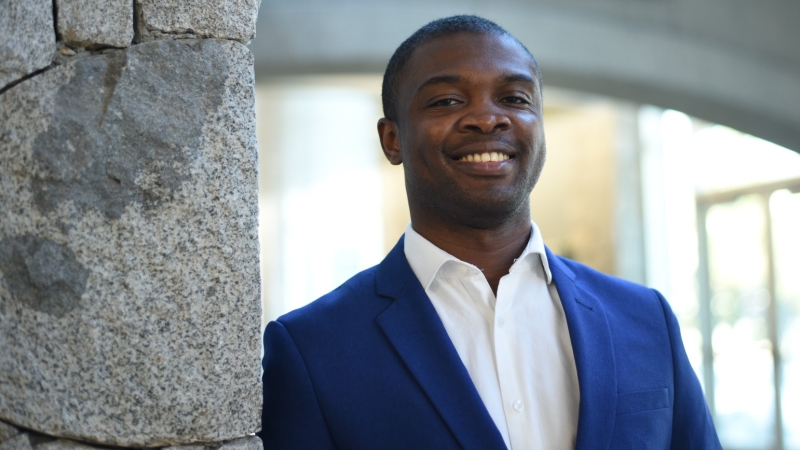Representation matters
Forests mean different things to different people. UNBC Ecosystem Science and Management Assistant Professor Dr. Samuel Bartels wants to see more diverse voices included when we consider the future of our forests.

As a young boy admiring the towering trees of the tropical rainforests in western Ghana, Dr. Samuel Bartels never conceived his interest in the flora of the forest would lead to a career in academia. Now he’s using his position as a faculty member at UNBC to inspire future Black forestry researchers through mentorship and representation.
“Although forestry as a discipline is well known and respected in Canada, it is discomforting to see very little representation of Black and racialized people, especially in enrolments at the undergraduate level,” Bartels says. “To me, it boils down to the natural principle of representation. One needs to first see it to be attracted to it. Thus, with so few of us in positions of influence who can act as role models and career mentors, it is not surprising that Black people find little inspiration to pursue a career in forestry.”
Bartels joined UNBC as an Assistant Professor in Ecosystem Science and Management in 2020, with expertise in applied forest ecology and silviculture. His research program focuses on how natural and anthropogenic disturbances affect forest stand dynamics, including biodiversity, and productivity.
He began his post-secondary studies at the Kwame Nkrumah University of Science and Technology in Kumasi, Ghana studying renewable natural resources and completed his undergraduate degree in forestry. He moved to Canada for graduate studies, earning both a master’s degree and PhD from Lakehead University.
But it has been, at times, a lonely journey.
“I consider myself among the very few Black researchers who have been fortunate to forge a career path in academia, let alone in a specialized field such as forestry,” he says. “It is such a rarity that too often in my professional circles I find myself as the only Black academic or person of colour around the table at focus group meetings, including conferences, seminars, or workshops, which is sometimes disheartening.”
As disheartening as the situation seems, Bartels does see signs that things are changing for the better. He’s encouraged by initiatives like Project Learning Tree Canada, which is reaching out to children and youth from diverse backgrounds and supporting them on career pathways in a variety of environmental fields, including forestry.
The next step is ensuring the next generation of Black foresters are afforded opportunities to put their expertise to use in the field.
“In keeping with our commitments to equity, diversity, and inclusion, companies that hire forestry professionals can take a step further to purposefully attract and recruit those who are Black, Indigenous, and people of colour to increase representation in the workplace,” Bartels says. “I believe that the many barriers that Black people and other racialized groups face continue to exist even in academic settings. Now that I have been able to overcome many of them to reach my goal, it behooves me to motivate others to aspire for greater achievements.”
Diversifying the forestry profession by supporting members of equity-seeking groups in their career progressions will lead to better forest management overall.
Forests mean different things to different people. By including a diverse set of voices, a more complete set of economic, social and cultural values will be considered as we make decisions about how we use and preserve our forests.
“Creating space for different perspectives and diverse voices will help to enhance decisions and formulate policies that reflect the interests of the entire population,” Bartels explains.
Bartels’ interest in the dynamics of the forest dates back to his childhood.
“I remember my youthful days and how I occasionally went on solitary hikes in a backyard forest somewhere in the tropical rainforest just to admire and count big trees that I would encounter on a familiar trail,” Bartels recalls. “Then, my little brain anytime I went back was to check on the other trees to see if they had grown any bigger to catch up with the big ones.”
Bartels is grateful for the mentorship he’s received throughout his career. He’s felt supported by his colleagues and has had opportunities to showcase his research.
“My current rare position as Black professor in forestry research in a reputable Canadian institution such as UNBC is a success story and one that is sure to inspire many Black and other racialized scholars to aim higher,” Bartels says. “I have a duty to shine brighter and inspire hope in my community.”
